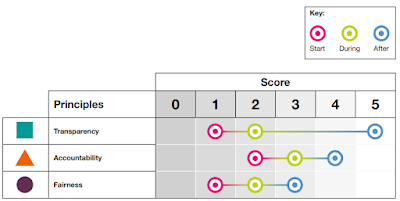- Establish governance for data ethics & AI and consider the importance for data collection and sharing.
- Describe how/when fairness happens and how/what biases have been accounted for
- Provide mechanisms for recourse.
Harvard business review has an article Create an Ethics Committee to Keep Your AI Initiative in Check
Accenture have a summary page Building data and AI ethics Committee in your business
Accenture have a full report on building a data ethics committee.
- understand unintended and or negative consequences
- human rights considerations
- justify the benefit
- make user needs and public benefit transparent
- check everyone understand user need and how to use the data
- ensure diversity within your team
- involve external stakeholders
- effective governance structures with experts
- transparency
- compliance with GDPR and DPA 2018
- data protection by design
- accountability
- transparency
- project complainant with the equality act 2010
- ensure effective governance of your data
- data source being used
- meta data understood
- processes to maintain integrity
- is synthetic data appropriate for the project evidence based caveats
- bias in data to train the model
- determine proportionality
- data anonymisation
- robust practices - demonstrated reproducibility, quality of the model
- make data open and shareable whenever possible
- think about transparency of sensitive models
- explainability
- repeatability
- project influences
- accountability structures
- skills, training and maintenance for longevity of the project
- share learnings
Another model is the Data Ethics Decision Aid. DEDA is a tool-kit facilitating initial brainstorming sessions to map ethical issues in data projects, documenting the deliberation process and furthering accountability towards the various stakeholders and the public.





No comments:
Post a Comment
Note: only a member of this blog may post a comment.